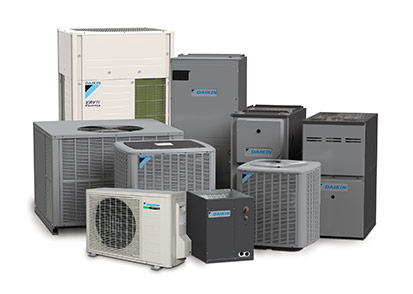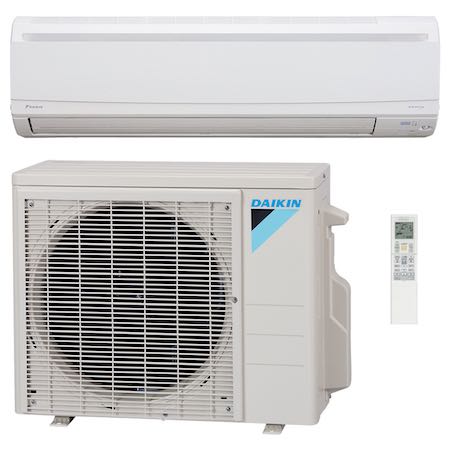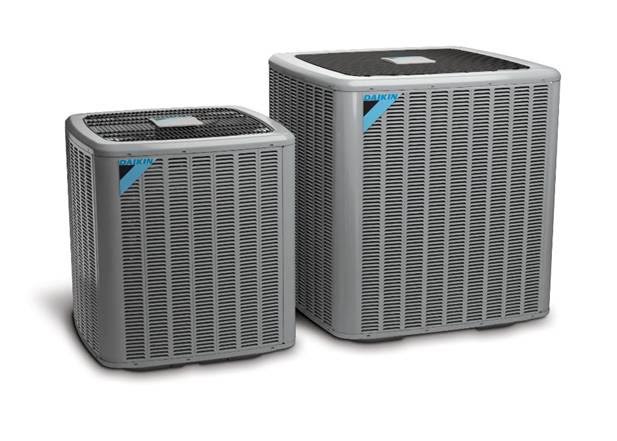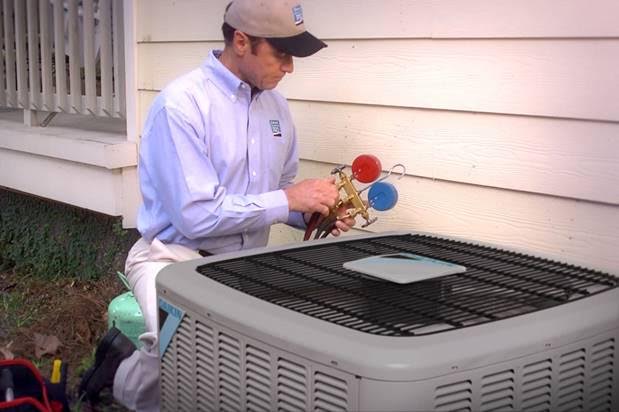Table of Contents
What is a heat pump and how does it work? Top
A heat pump is a home heating and cooling device that works by “moving” heat from one place to another. Heat is just another word for thermal energy. Different kinds of energy can be converted into thermal energy. Most commonly, our homes are heated by turning electric energy (electricity) or chemical energy (oil furnace) into thermal energy. A heat pump works by simply moving existing thermal energy from one place to another.
Heat naturally moves to cooler places—the easiest demonstration of this principle is what happens when you open a window in winter. The warm air moves outside to where the air is cold, making the room cool down rapidly. Heat pumps reverse this process by taking warm air from a cold area (like outside) and moving it to a warmer area (like your home).
Most of the cost of home heating comes from warming up cold air. For example, if you turn on a space heater, the fan that blows warm air out doesn’t use nearly as much energy as the heating element that warms the air. Any electrical heating system relies entirely on electricity to produce and distribute heat. Heat pumps only rely on electricity to distribute existing heat.

A heat pump works by pushing refrigerant through a pair of coils. One coil is indoors, the other outdoors. In cooler weather, when you want to heat your home, the outdoor coil acts as an evaporator of refrigerant (a fluid used in many different systems that are meant to change the temperature of a given area) and the indoor coil acts as a condenser. When the refrigerant is turned to gas in the outdoor evaporator coil, it absorbs thermal energy from the surrounding air and then moves to the cooler indoor coil. That coil condenses the refrigerant vapour back into a liquid using compression, and the thermal energy (heat) is released into the indoor air.
Since a heat pump is only moving thermal energy from one place to another and not converting another type of energy into heat, it is more efficient than other types of heating mechanisms.
You may not think that heat pumps can work in winter here in Atlantic Canada, but they do! There is still warm air outside, otherwise we’d all freeze solid as soon as we step out the door. Daikin heat pumps can reliably deliver enough warm air to keep your home comfortable in conditions as cold as -25 degrees Celsius. In fact, the outdoor air only loses about 15% of its thermal energy at sub-zero temperatures compared to a nice summer day. In very cold weather—the kind we rarely see—a backup heat source may need to be used.
Click here to learn more about how to measure heat pump performance.
What are the different types of heat pumps? Top
There are several kinds of heat pumps: [simple_tooltip content=”Air-source heat pumps draw heat from the outside air during the heating season and reject heat outside during the summer cooling season.”]air source[/simple_tooltip], [simple_tooltip content=”A ground-source heat pump uses the earth or ground water or both as the sources of heat in the winter, and as the ‘sink’ for heat removed from the home in the summer.”]ground source[/simple_tooltip], [simple_tooltip content=’Hybrid heat pump systems are comprised of a gas furnace and an electric heat pump.‘]hybrid[/simple_tooltip], to name a few.
Air source heat pumps draw heat from the air. Ground source (or geothermal) heat pumps draw heat from the ground. Hybrid heat pumps draw heat from two sources, one of which may be a traditional heat source, such as air and a furnace.
The heat pumps you’ll most often see in Atlantic Canada are air source, which can be ducted or ductless (also called mini-split).

Get the Daikin Atlantic Heat Pump Product Catalogue Today!
What are ductless or mini split heat pumps and how do they work? Top
Ductless heat pumps, commonly referred to as mini split heat pumps, are another excellent option for many types of homes. Mini split heat pumps are commonly installed in homes that do not have existing ductwork (for example, homes with electric baseboard heat) to avoid the cost of retrofitting. Mini split heat pumps consist of one outdoor unit feeding multiple indoor units. The indoor units can be installed virtually anywhere in your home, allowing for highly customizable temperature control in different rooms and areas.

What are ducted heat pumps and how do they work? Top
Ducted heat pumps have one outdoor unit and one indoor unit. Heat is delivered throughout your home using ductwork. A ducted heat pump is a good choice for homeowners with an existing ducted system, such as electric or oil forced air systems.
Ducted heat pumps can also be installed in homes without existing ductwork. Your home will need to be retrofitted to accommodate a ducted heating system. Ducted heat pumps are ideal for new home construction, as you can fit the system to your specific needs.

How do heat pumps provide air conditioning? Top
In the “What is a heat pump and how does it work?” section, we described how heat pumps work to absorb and release thermal energy from the cooler air outside to the warmer air inside. Heat pumps can also provide air conditioning simply by reversing this process. When a heat pump is switched to cooling mode, it removes heat from the indoor air and transfers it outdoors.
Download The Guide On How to Stay Cool This Summer Using a Heat Pump
What to expect when a Daikin dealer assesses your home Top
If you’re feeling overwhelmed by trying to figure out which heat pump you need, don’t worry—the best way to determine the heat pump you need is by having a highly trained and qualified Daikin Dealer assess your home.
A qualified Daikin Dealer will ask you a few questions and recommend the best model for you and your family. Even if you have a model in mind, getting a heat pump consultation could result in your Daikin Dealer identifying a more efficient and cost-effective model for your unique home.
Which heat pump is best for your home depends on many factors, including:
- Existing ductwork (or lack of)
- Size of your home
- Age of your home
- Layout of your home (how many floors, how many rooms, and how they’re arranged)
- Desired placement of units
- What your current heating and cooling solutions are, and how your heat pump will work with them
- Your (and your family’s) personal comfort preferences
How much do heat pumps cost? Top
The total cost of your heat pump will depend on what model you and your Daikin dealer choose for your home, whether it is ducted or ductless, and what is needed in terms of installation.
Most homeowners agree that the best part about their heat pump (apart from year-round home comfort) is that it pays for itself in a fairly short period of time by saving them significant amounts of money on their monthly bills. Since heat pumps are more efficient than other heat sources like electric or oil, you will see a huge difference in your utilities bills. Your heat pump will continue to save you money long after it has paid for itself.
Pay Less Per Month and Get More Comfort With a Daikin Heat Pump. What Will You Save?
How is a heat pump installed and how long does it take? Top
Heat pump installation doesn’t have to be a lengthy process, but it’s not a task for DIYers. Even very handy homeowners should not be installing heat pumps on their own—and when you’re making a significant addition to your home, you want to ensure it’s done right the first time! Each certified Daikin Dealer is required to have a Red Seal HVAC-R journeyman/woman on staff to ensure your heat pump is installed properly. These technicians are also required to attend ongoing training to keep them up to speed on the latest HVAC-R and Daikin technology.
Heat pump installation becomes slightly more complicated if new ductwork is being installed (if a home was being retrofitted for a ducted unit), or if an oil furnace must be removed. Otherwise, the process generally involves installing the outdoor unit, installing the indoor equipment, connecting the two, and installing any other necessary pieces like line covers, gauge manifolds, and vacuum pumps.
When our certified Daikin heat pump installers put in a new mini split system, they will usually complete the install in the same day. Ducted systems take a little more work, but in a home with existing ductwork, your heat pump can be installed in as little as one day.
If you decide you want to install a heat pump in your home, you won’t have to wait long. Daikin dealers can usually schedule an installation project within one to two weeks of confirmation.
What does heat pump maintenance involve? Top
Like any heating system in your home, your heat pump will require occasional maintenance to maximize its lifespan and keep it working at peak performance. The type of maintenance required depends on the type of heat pump you have. Some of the maintenance can be done yourself, like cleaning the unit’s filters approximately once a month or keeping the outdoor unit clean and free of debris—this means periodically checking in the winter to make sure the outdoor unit is not buried in ice or snow, and cleaning off grass clippings, leaves, dirt, and other debris in the warmer months.
Finally, both your indoor and outdoor units should be deep cleaned and checked for loose wiring, worn bearings, etc. once per year. Contacting your Daikin Dealer for maintenance options is the best way to ensure your unit performs its best year after year.

How long do heat pumps last? Top
The lifespan of a heat pump is generally 15 to 20 years, depending on how well it is maintained. Be sure to ask about warranty coverage when choosing a heat pump dealer. Daikin Atlantic dealers offer a 10-year limited labour guarantee, and up to 12-year limited parts guarantee for ultimate peace of mind for homeowners investing in their family’s comfort.
Heat pumps are a great heating and cooling solution for the Atlantic Canadian climate. Read more here: Do Heat Pumps Work in Atlantic Canada?
How do I get a heat pump? Top
Does a heat pump sound like the perfect solution to increase your comfort at home and save money every month on your utility bills? Click here to find a dealer near you for a no-obligation heat pump consultation, and let a trusted Daikin expert help you find the best heat pump for your home!
